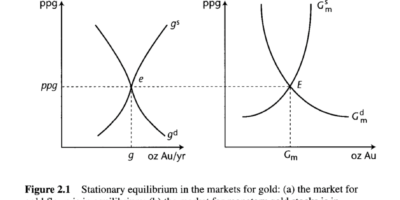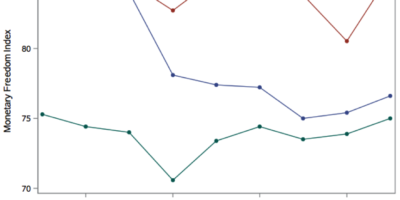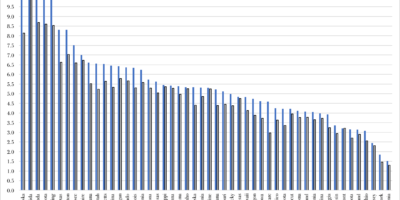
A commodity money is an item that individuals consume (or otherwise make use of) that also functions as a commonly accepted medium of exchange.
READ MORE
The following is a contribution by a visiting scholar from the Mannkal Foundation in Australia According to the 2015 Heritage Foundation index of economic freedom, the United States is ranked 88th out of 186 countries for monetary freedom, with a scor …
READ MORE
Over at the Wall Street Journal, Greg Ip sees a lack of competition in corporate America.
READ MORE
The prolonged recovery that followed the Great Recession has brought about increased support for a monetary policy rule known as Nominal Gross Domestic Product (NGDP) targeting. This form of targeting combines employment and inflation into one metric. …
READ MOREUltimately, an economy can only sustain itself if it produces more than it consumes. That’s a lesson that the Soviet Union learned the hard way decades ago, explains Atlas Network Sound Money Project Senior Fellow Jerry Jordan in a column for Forbes, b …
READ MORE
Originally posted on the Atlas Network page With Greece rejecting the structural reforms and other terms that it would need to implement for yet another bailout of its crushing government debt, economists are questioning whether the eurozone and its sh …
READ MORE
Previously I discussed inflation targeting as a popular rule for governing central bank behavior. In this post I will discuss interest rate targeting, another popular recommendation that has its own costs and benefits. The most prominent interest rate …
READ MORE
As I write these lines, it is almost certain that Greece will default on its debt today, June 30. What led to such a disastrous situation? To understand, we must look back in time to the events leading up to and surrounding today’s expected default. A …
READ MORE
The need for and convenience of a central bank are usually taken for granted. To say that a central bank is a good institution and, therefore, needed, is not enough. Unfortunately, the assumption that central banks are necessary seems to weigh more hea …
READ MORE
Among economists who agree that monetary policy should be conducted according to predictable rules, perhaps no proposed rule enjoys greater support than inflation targeting. In brief, inflation targeting means the central bank conducts monetary policy …
READ MORE
Over the next few weeks, the Sound Money Project will be running a series of blog posts exploring free-market monetary alternatives. Our dedicated fellows will prepare a series of posts that explain the principles and importance of the following topics …
READ MORE
In a recent blog post, Alex Salter discusses the problem of reasoning from a price change in the context of interest rates. Simply put, observing a low interest rate does not necessarily mean that monetary policy is loose (or tight!). Instead, we shoul …
READ MORE250 Division Street | PO Box 1000
Great Barrington, MA 01230-1000
Press and other media outlets contact
888-528-1216
press@aier.org
This work is licensed under a
Creative Commons Attribution 4.0 International License,
except where copyright is otherwise reserved.
© 2021 American Institute for Economic Research
Privacy Policy
AIER is a 501(c)(3) Nonprofit
registered in the US under EIN: 04-2121305